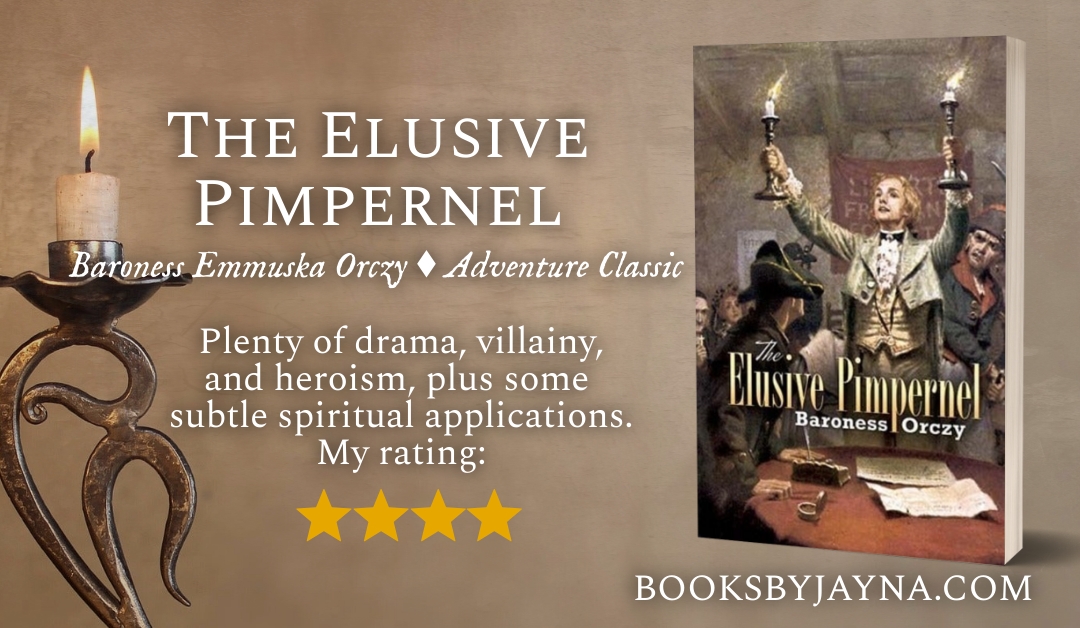Plenty of drama, villainy, and heroism, plus some subtle spiritual applications. Note: Secular author.
My rating: ★★★★☆
Thanks to a Christmas gift, this is the second time I’ve experienced this return to the intriguing world of Sir Percy and Marguerite. The Elusive Pimpernel is almost as good as the first book. Possibly just as good, though shorter. We get to spend most of the book with Marguerite, Sir Percy, and Chauvelin, which is as it should be. There is something deliciously thrilling about a book where one knows beyond a shadow of a doubt that the good guy will triumph. The only question is how.
The sequel that is not a sequel
The correct order of the Pimpernel books can be a bit confusing. The publication order is not the same as the order in which the series events occur.
In publication order, The Elusive Pimpernel is #3. This follows The Scarlet Pimpernel (the original novel) at #1 and I Will Repay at #2. But I Will Repay is not primarily about the Scarlet Pimpernel himself. The story revolves around two French refugees with only cameo appearances by Sir Percy, so it’s hard to consider it a true sequel.
In chronological order, two prequel novels about the Blakeney ancestors start the series. Next we have The Scarlet Pimpernel, Sir Percy Leads the Band, and The League of the Scarlet Pimpernel. (Links are to my Goodreads or blog reviews.) I Will Repay follows these before we get to The Elusive Pimpernel.
Regardless of either publication order or chronological order, The Elusive Pimpernel “feels” like the direct sequel to the original novel. It’s set in the world of the English upper class and is told primarily through the eyes of Marguerite and Chauvelin. The story introduces new intrigues but follows the characters we know and love. (Or love to hate, in Chauvelin’s case.)
For those reasons, I usually recommend it as the “next in series.” Readers who prize true chronological order may prefer I Will Repay first, since it introduces characters who reappear in The Elusive Pimpernel.
In which Sir Percy does not follow his heart
I appreciate the realism of the Blakeneys’ relationship in that everything isn’t hunky-dory even though husband and wife are now thoroughly in love with each other (to a degree that fashionable London society finds embarrassing). In the first book, Marguerite has no idea how to interpret the change that has come over her husband and Sir Percy has no idea whether he can trust a woman who apparently betrayed an innocent family. Having resolved that tension, Baroness Orczy introduces a new one:
Can Marguerite’s newfound love bear to see her husband risk his life over and over for other people? If he really loved her, would he leave her so often?
Maybe it’s selfish of her, but it’s very realistic. Many books would simply have Sir Percy decide that “love conquers all” so he and Marguerite can enjoy their wedded bliss. But The Elusive Pimpernel shows us that although Sir Percy’s passion for Marguerite is beyond question, she cannot change the man he is, and he cannot sacrifice the lives of thousands for their own happily ever after. (This is another example of secular fiction that gives less intimate detail than much of today’s Christian fiction without weakening the characters’ passion for each other.)
I think we all know, deep down, that true heroes don’t follow their hearts and live their own best life. This reminds me of the 1950s Disney Zorro episode in which the question is asked, “Doesn’t Zorro have the right to take off his mask and live his own life?” and the answer is “No.”
Biblical lessons from an adventure classic
In addition to true heroes giving up their own desires, this story has given me other biblical reminders, strange as it may seem to find spiritual applications in a secular adventure novel:
First, Marguerite deeply cares for the French refugee girl entrusted to her keeping. Not because she has any particular love for her or knows her all that well, but because Sir Percy risked his life to save her. Marguerite can’t help but love anyone who represents the sacrifice of the man she adores. That’s how we should see every fellow believer—beloved not because of their own worth but because our Beloved gave his life to save them.
And second, there’s a scene where Marguerite has gotten herself into serious trouble at the hands of Chauvelin and is on the verge of utter despair. (Knowing Marguerite, it would be beautiful, graceful, stage-worthy despair, but still.) I love this scene for the moment in which she abruptly realizes that she has no reason for despair. She’s married to the Scarlet Pimpernel, after all! How often do we give in to fear instead of remembering we’re bound by covenant to the greatest Rescuer in the universe? Though Marguerite, like us, continues to wrestle her anxiety, it’s a powerful reminder that we have no need to fear.
On the other hand…
I do think everyone would have been much better off if Marguerite had acted on her much-declared love and simply trusted Sir Percy instead of gallivanting after him and getting not only herself and Sir Percy but also an entire village in a serious pickle. I wanted to talk sense to her now and then. Especially when Chauvelin’s devious plans were laid bare to the reader and Marguerite walked blithely into his traps. (This was despite being described as “the cleverest woman in Europe.”)
And speaking of Chauvelin’s devious plans, his scheme to bring down the Scarlet Pimpernel seemed vaguely naive to me. Surely he didn’t think it would succeed as far as the League of the Scarlet Pimpernel was concerned. But that’s a villain for you, thinking of his schemes more highly than he ought to think.
The good and bad of The Elusive Pimpernel
If you’re in this book for the Scarlet Pimpernel himself, however, Sir Percy is at his best both in and out of character. (Those flashes between personalities are such fun.) I loved seeing him pop up hither and yon and disconcert the man we all love to hate. I loved watching Chauvelin squirm at his inability to figure out just what the Scarlet Pimpernel had up his sleeve. And I loved trying to guess it along with him.
I did not love the plethora of ellipses that peppered the dialogue and made it sound as if Sir Percy and Chauvelin perpetually falter when they speak. But I suppose that’s just another instance of the dramatic, flowery writing style that wears a bit after a while. Readers should also note that The Elusive Pimpernel contains as much profanity as the original novel.
Although this book is not the second in the series, it feels that way, and I highly enjoyed the continuation of my favorite characters’ stories. I grinned like a fool through much of it. There’s just something about waiting for Sir Percy to drop the other shoe on the unsuspecting Chauvelin. All in all, an exhilarating return to the cast and setting of the original novel, recommended for those who love adventure, drama, and the world of The Scarlet Pimpernel.
Buy The Elusive Pimpernel on Amazon (affiliate link)

If you enjoyed this book review of The Elusive Pimpernel by Emmuska Orczy, you might also enjoy my book review of The Scarlet Pimpernel, first in series by the same author. Read the review here or join my newsletter list for book recommendations, a free short story, author updates, and more.
Do you love a good hero?
Christian historical fiction series For Liberty & Conscience brings you faith-filled adventures bursting with courageous characters and biblical truth amid the danger of America’s founding. Click a cover for details or see all books here.
Happy reading!

Jayna Baas is the author of Preacher on the Run and director of The Christian PEN: Proofreaders and Editors Network. Learn more about Jayna here or join her email list for more recommendations.



